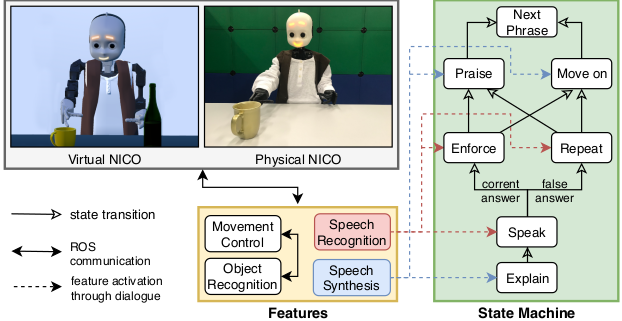Virtual or Physical? Social Robots Teaching a Fictional Language Through a Role-Playing Game Inspired by Game of Thrones
Hassan Ali, Shreyans Bhansali, Ilay Köksal, Matthias Möller, Theresa Pekarek-Rosin, Sachin Sharma, Ann-Katrin Thebille, Julian Tobergte, Sören Hübner, Aleksej Logacjov, Ozan Özdemir, Jose Parra, Mariela Sanchez, Nambiar Surendrakumar, Tayfun Alpay, Sascha Griffiths, Stefan Heinrich, Erik Strahl, Cornelius Weber, Stefan Wermter
Conference: Proceedings of the International Conference on Social Robotics (ICSR 2019), pp. 358-367, Madrid, Spain, Nov 2019

Abstract: In recent years, there has been an increased interest in the role of social agents as language teachers. Our experiment was designed to investigate whether a physical agent in form of a social robot provides a better language-learning experience than a virtual agent. We evaluated the interactions regarding enjoyment, immersion, and vocabulary retention. The 55 participants who took part in our study learned 5 phrases of the fictional language High Valyrian from the TV show Game of Thrones. For the evaluation, questions from the Almere model, the Godspeed questionnaire and the User Engagement Scale were used as well as a number of custom questions. Our findings include statistically significant results regarding enjoyment (p=0.008) and immersion (p=0.023) for participants with little or no prior experience with social robots. In addition, we found that the participants were able to retain the High Valyrian phrases equally well for both conditions.
